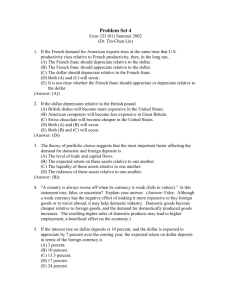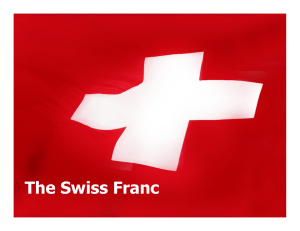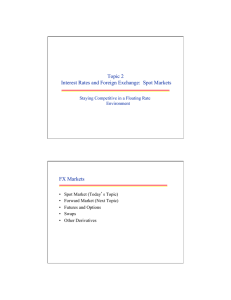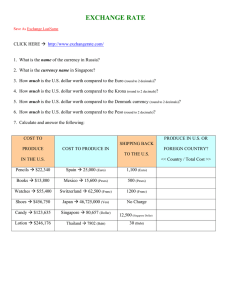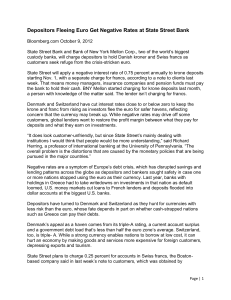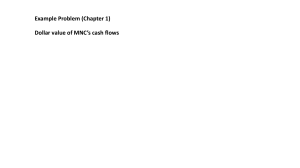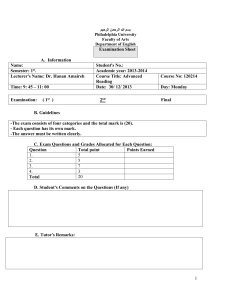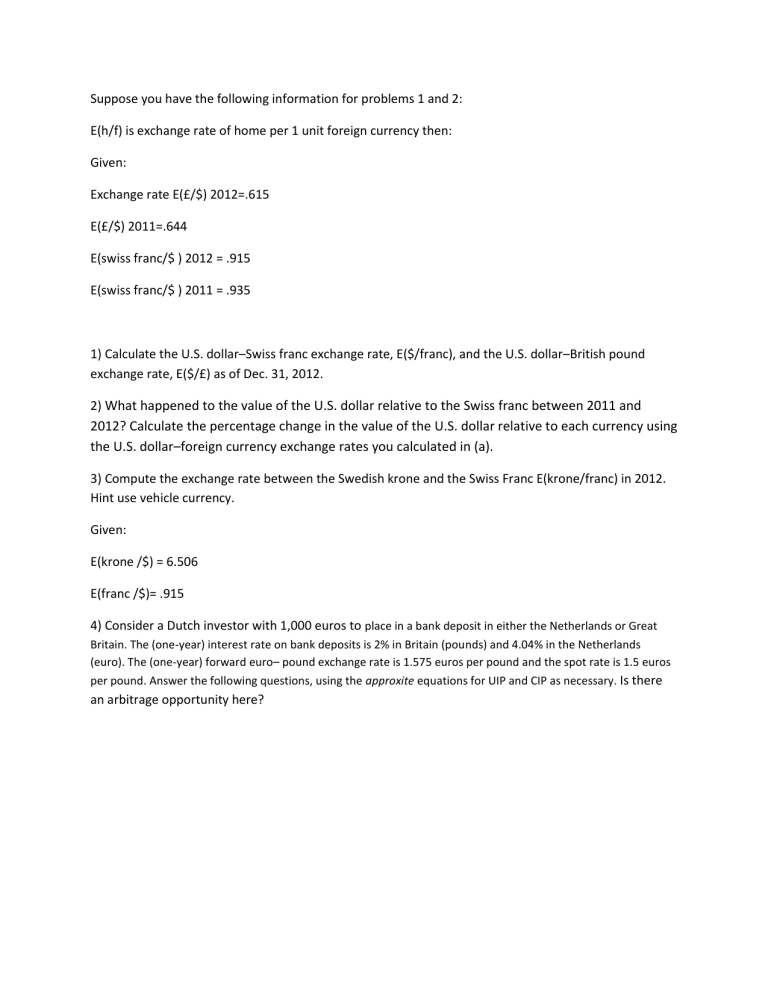
Suppose you have the following information for problems 1 and 2: E(h/f) is exchange rate of home per 1 unit foreign currency then: Given: Exchange rate E(£/$) 2012=.615 E(£/$) 2011=.644 E(swiss franc/$ ) 2012 = .915 E(swiss franc/$ ) 2011 = .935 1) Calculate the U.S. dollar–Swiss franc exchange rate, E($/franc), and the U.S. dollar–British pound exchange rate, E($/£) as of Dec. 31, 2012. 2) What happened to the value of the U.S. dollar relative to the Swiss franc between 2011 and 2012? Calculate the percentage change in the value of the U.S. dollar relative to each currency using the U.S. dollar–foreign currency exchange rates you calculated in (a). 3) Compute the exchange rate between the Swedish krone and the Swiss Franc E(krone/franc) in 2012. Hint use vehicle currency. Given: E(krone /$) = 6.506 E(franc /$)= .915 4) Consider a Dutch investor with 1,000 euros to place in a bank deposit in either the Netherlands or Great Britain. The (one-year) interest rate on bank deposits is 2% in Britain (pounds) and 4.04% in the Netherlands (euro). The (one-year) forward euro– pound exchange rate is 1.575 euros per pound and the spot rate is 1.5 euros per pound. Answer the following questions, using the approxite equations for UIP and CIP as necessary. Is there an arbitrage opportunity here? Answers: Suppose you have the following information for problems 1 and 2: E(h/f) is exchange rate of home per 1 unit foreign currency then: Given: Exchange rate E(£/$) 2012=.615 E(£/$) 2011=.644 E(swiss franc/$ ) 2012 = .915 E(swiss franc/$ ) 2011 = .935 1) Calculate the U.S. dollar–Swiss franc exchange rate, E($/franc), and the U.S. dollar–British pound exchange rate, E($/£) as of Dec. 31, 2012. E($/£) = 1/.615 = 1.63 E($/franc)= 1/.915 = 1.093 2) What happened to the value of the U.S. dollar relative to the Swiss franc between 2011 and 2012? Calculate the percentage change in the value of the U.S. dollar relative to each currency using the U.S. dollar–foreign currency exchange rates you calculated in (a). E(franc/$) 2012 = .915 E(franc/$) 2011 = .935 E($/franc) 2012 = 1/.915 = 1.093 E($/franc) 2011 = 1/.935 = 1.07 Franc appreciates because 1 dollar can buy less francs in 2012 and 1 franc can buy more dollars in 2012. With exchange rate expressed in franc/$ Exact percent change from 2011 to 2012: (.915/.935 -1)*100 = -2.2% franc appreciation Notice if the exchange rate is expressed in $/franc then get: Exact percent change from 2011 to 2012: (1/.915) / (1/.935) - 1 = .935/.915 – 1 = .021 or 2.1% franc appreciation. As the book states these will be different. However using the approximate percent change (ln(.935) – ln(.915))*100 = 2.2% franc depreciation will be the same in either case. 3) Compute the exchange rate between the Swedish krone and the Swiss Franc E(krone/franc) in 2012. Hint use vehicle currency. Given: E(krone /$) = 6.506 E(franc /$)= .915 E(krone/franc) = E(krone /$)/ E(franc /$) = 6.506/.915 = 7.1 4) Consider a Dutch investor with 1,000 euros to place in a bank deposit in either the Netherlands or Great Britain. The (one-year) interest rate on bank deposits is 2% in Britain (pounds) and 4.04% in the Netherlands (euro). The (one-year) forward euro– pound exchange rate is 1.575 euros per pound and the spot rate is 1.5 euros per pound. Answer the following questions, using the approxite equations for UIP and CIP as necessary. Is there an arbitrage opportunity here? Convert returns in same currency in the end and that will tell you where you should invest money. The return is going to be higher in the UK. Yes there is arbitrage opportunity I should borrow a lot of euros now, and buy a lot of pounds with those now. After 1 year I can sell pounds for much more euros and pay off the euro debt and keep the remaining euros. CIP: 𝑖ℎ − 𝑖𝑓 = ln(𝐹ℎ ) − (𝐸ℎ ) 𝑓 where 𝑖ℎ is interest rate at home expressed in decimal (a fraction of 𝑓 100) So assume Netherlands is home country and Britain is foreign. Notice: .0404 – .02 = .0204 and ln(1.575) – ln(1.5) = .049 Therefore .0204<.049. The exchange rate depreciates more that then interest rate differential and so should invest in UK.
